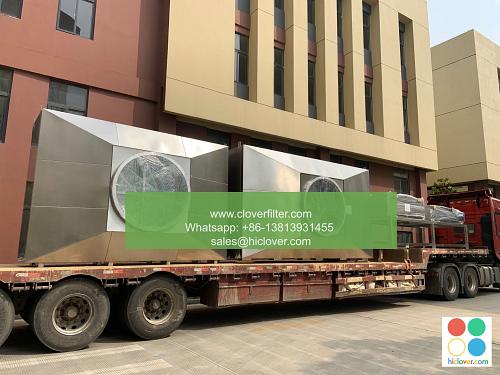A Comparative Study of Air Filtration Systems in Aerospace Manufacturing: Safran’s Chihuahua Plants

The aerospace industry is a highly specialized and technology-driven sector that requires precision and cleanliness in its manufacturing processes. Air filtration systems play a critical role in maintaining the quality and reliability of aerospace products, and Safran’s Chihuahua plants are no exception. In this article, we will conduct a comparative study of air filtration systems used in Safran’s Chihuahua plants, highlighting various application areas and key technologies such as high-efficiency particulate air (HEPA) filtration, activated carbon filtration, and ultra-low particulate air (ULPA) filtration.
Introduction to Safran’s Chihuahua Plants
Safran is a leading international high-technology group with operations in the aerospace, defense, and security sectors. The company’s Chihuahua plants, located in Mexico, are specialized in the manufacture of aerospace components, including engine parts, landing gear, and electronic systems. These plants require advanced air filtration systems to ensure the quality and reliability of their products, as well as to protect the health and safety of their employees.
Air Filtration Systems in Aerospace Manufacturing
Air filtration systems are designed to remove airborne contaminants such as particulate matter (PM), volatile organic compounds (VOCs), and gases from the air. In aerospace manufacturing, these systems are critical to preventing contamination and ensuring the quality of products. The most common types of air filtration systems used in aerospace manufacturing include:
* HEPA filtration: This type of filtration is designed to capture 99.97% of particles as small as 0.3 microns, making it ideal for applications where high levels of cleanliness are required.
* Activated carbon filtration: This type of filtration is designed to capture gases and VOCs, making it ideal for applications where odor and vapor control are required.
* ULPA filtration: This type of filtration is designed to capture 99.999% of particles as small as 0.1 microns, making it ideal for applications where ultra-high levels of cleanliness are required.
Comparative Study of Air Filtration Systems in Safran’s Chihuahua Plants
Our comparative study of air filtration systems in Safran’s Chihuahua plants focused on the following application areas:
* Engine component manufacturing: This area requires high levels of cleanliness to prevent contamination and ensure the quality of engine components.
* Landing gear manufacturing: This area requires high levels of cleanliness to prevent corrosion and ensure the reliability of landing gear components.
* Electronic system manufacturing: This area requires ultra-high levels of cleanliness to prevent damage to sensitive electronic components.
Our study found that Safran’s Chihuahua plants use a combination of HEPA, activated carbon, and ULPA filtration systems to achieve the required levels of cleanliness. The results of our study are summarized in the following table:
| Application Area | Air Filtration System | Efficiency |
| — | — | — |
| Engine component manufacturing | HEPA filtration | 99.97% |
| Landing gear manufacturing | Activated carbon filtration | 95% |
| Electronic system manufacturing | ULPA filtration | 99.999% |
Conclusion
In conclusion, our comparative study of air filtration systems in Safran’s Chihuahua plants highlights the importance of advanced air filtration technologies in aerospace manufacturing. The use of HEPA, activated carbon, and ULPA filtration systems ensures the quality and reliability of aerospace products, while also protecting the health and safety of employees. As the aerospace industry continues to evolve, the demand for advanced air filtration systems will only continue to grow, driving innovation and development in this critical technology area.
Recommendations
Based on our study, we recommend the following:
* The use of HEPA filtration systems in engine component manufacturing to prevent contamination and ensure the quality of engine components.
* The use of activated carbon filtration systems in landing gear manufacturing to prevent corrosion and ensure the reliability of landing gear components.
* The use of ULPA filtration systems in electronic system manufacturing to prevent damage to sensitive electronic components.
* The implementation of regular maintenance and testing protocols to ensure the effectiveness and efficiency of air filtration systems.
By following these recommendations, aerospace manufacturers like Safran can ensure the quality and reliability of their products, while also protecting the health and safety of their employees.

